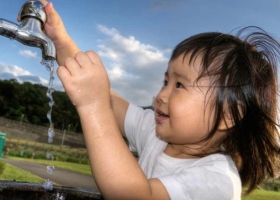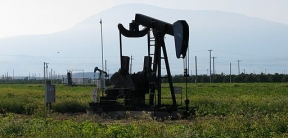This week, Lauren Davis, program associate for the 11th Hour Project and co-chair of HEFN’s Hydrofracking Working Group, guest blogs. Lauren splits her time between the 11th Hour Project’s work on human rights and its energy-related work on issues related to oil, gas, and hydraulic fracturing.
In September, California Governor Jerry Brown signed into law a bill that makes it state policy to protect every Californian’s right to safe, clean water. CA Assembly Bill 685 reads that “it is hereby declared to be the established policy of the state that every human being has the right to safe, clean, affordable, and accessible water adequate for human consumption, cooking, and sanitary purposes.” My hope was that the state I live in would finally regulate or ban high-volume horizontal hydraulic fracturing, also known as “fracking” — a process fraught with threats to our precious water resources (see here[i] and here).
This was an optimistic moment after a depressing legislative year around fracking, which is almost entirely unregulated in California. Back in May, the State Senate rejected a bill that would have simply notified residents if fracking was going to occur within 300 feet of their home. In August, CA AB 591 and CA AB 972 aimed to require the disclosure of chemicals used in fracking fluid or place a moratorium on the practice until regulations were put into place; both died on the Senate floor. After so many defeats, last month’s water rights bill gave me hope that California would begin to see fracking through the prism through which 11th Hour has begun to think about it.
The 11th Hour Project began researching fracking in early 2010 and started grantmaking around the topic in mid-2011. Around that time, we also launched a new program dedicated to human rights, focused primarily in the Democratic Republic of Congo. The Human Rights program was the first at our organization to dive deeply into the international landscape. We quickly realized that our efforts in the developing world might prompt different questions and require new metrics than the ones we use to evaluate our domestic initiatives. But should it? Our work in the DRC is motivated by two simple goals: to increase dignity for all people in that country, and to bring justice to those who are suffering at the hands of the powerful. These goals felt instinctual the more we learned about the country and its complicated history, and they felt imperative as a part of a program under the label, “human rights.”
However, when we characterize our work on fracking, focused domestically in places like New York or Pennsylvania through our Renewable Energy/Climate Change program, we often speak about carbon emissions, public health threats or pressure from fossil fuel industries. Increasingly, other funders who work on climate change issues have narrowed their focus to analyzing the fugitive methane emissions from hydrofracking, while conservation-focused peers emphasize the importance of protecting “special places” like national parks or sensitive ecosystems.
But the most powerful stories coming out of communities hardest hit by the harsh realities of shale development rarely, if ever, mention “fugitive emissions” or “parts per million.” If they do refer to a “special place,” it’s usually the family backyard, or the creek where they first learned to fish.
Here at 11th Hour Project, we have begun to think of our fracking work as preserving the dignity of New Yorkers in frack-free communities or fighting for justice for Pennsylvanians harassed by the natural gas industry. We aim to protect the basic human right to clean, safe water, a right more difficult to preserve with global climate change. This view of our work increases our dedication to grantmaking that benefits local organizations and local community efforts. We believe that these fights are personal and that some of the most effective efforts highlight how peoples’ lives are being affected.
Hearing news of Gov. Brown’s support for Californian’s rights to clean water, I was curious if other states had dedicated themselves to this ideal. Turns out, there are a few other states that have taken this same step, including Pennsylvania. I came across this gem from section 27 of Pennsylvania’s constitution: “The people have a right to clean air, pure water, and to the preservation of the natural, scenic, historic and esthetic values of the environment. Pennsylvania's public natural resources are the common property of all the people, including generations yet to come.” It’s time to change the narrative around fracking and hold Pennsylvania, California — and every other state — to higher standards. Fracking is infringing on basic human rights across the country. And whether you’re in Central Africa or Western Pennsylvania, preserving these rights should be central to our efforts.
[i] This report by the Pacific Institute was funded by The 11th Hour Project


